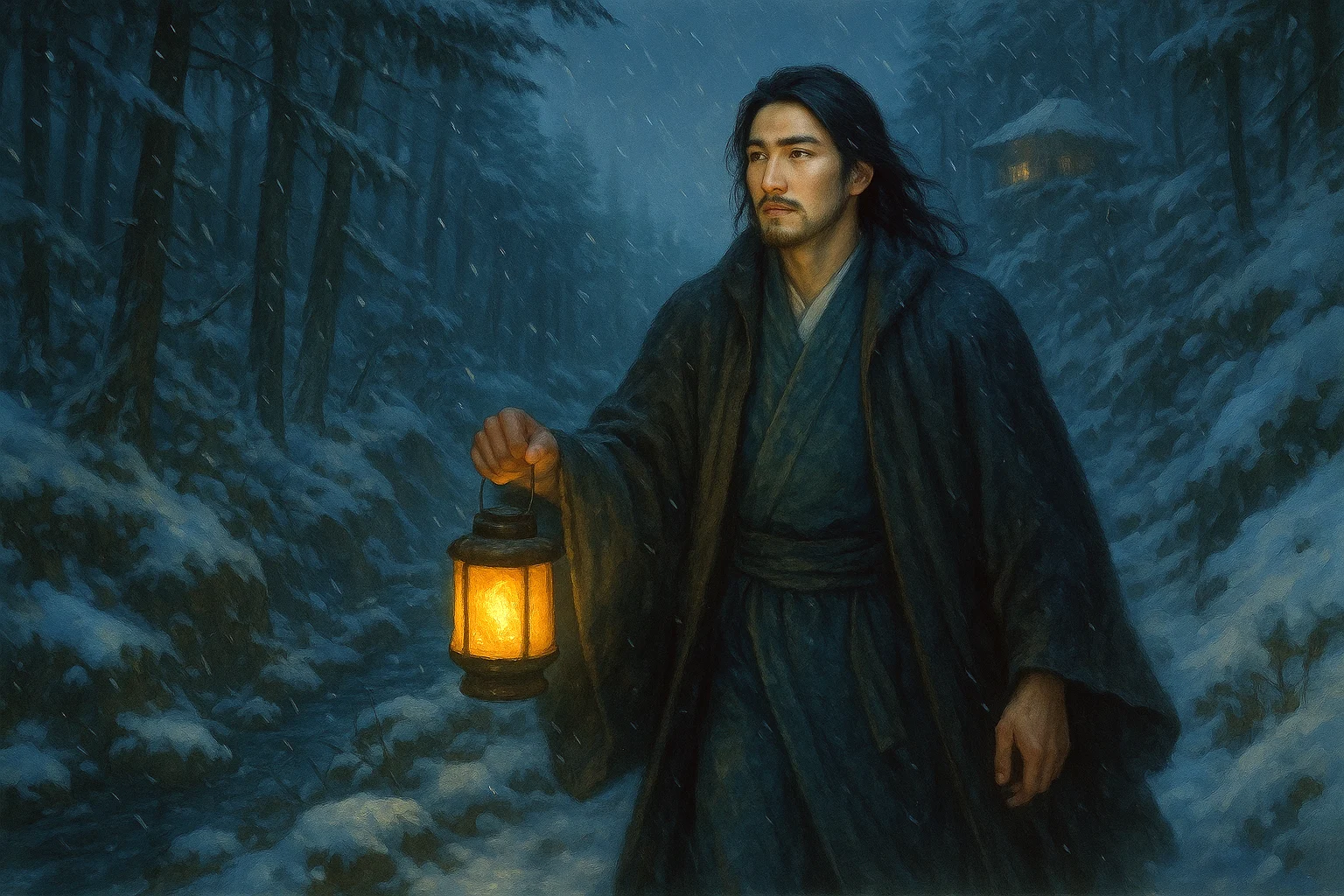Walking along a little path,
I find a footprint on the moss,
A white cloud low on the quiet lake,
Grasses that sweeten an idle door,
A pine grown greener with the rain,
A brook that comes from a mountain source -
And, mingling with Truth among the flowers,
I have forgotten what to say.
Original Poem
「寻南溪常道士」
刘长卿
一路经行处,莓苔见屐痕。
白云依静渚,芳草闭闲门。
过雨看松色,随山到水源。
溪花与禅意,相对亦忘言。
Interpretation
This poem was composed when the poet visited the reclusive Taoist priest Chang at Nanxi Mountain. While ostensibly depicting the scenery encountered along the journey, it subtly creates an atmosphere of serene detachment from worldly affairs through its landscape descriptions, conveying the poet's admiration and yearning for such leisurely reclusive life. The entire poem unfolds like an ink-wash landscape scroll, its understated progression revealing a Zen-like tranquility and sublimity.
First Couplet: "一路经行处,莓苔见屐痕。"
Yī lù jīng xíng chù, méi tái jiàn jī hén.
Along the path I traversed with care / Moss reveals faint footprints there
The opening presents sandal prints amidst wild strawberries and moss, suggesting both the path's infrequent use and the depth of the Taoist's seclusion. The moss's slow growth implies long undisturbed quietude, while the verb "reveals" subtly establishes the scene of an occasional visit to this worldly retreat.
Second Couplet: "白云依静渚,芳草闭闲门。"
Bái yún yī jìng zhǔ, fāng cǎo bì xián mén.
White clouds embrace the islet's rest / Sweet grasses guard the door in jest
This couplet balances distant and near views: the dynamic stillness of clouds encircling a quiet islet contrasts with the static seclusion of grasses barring an idle door. The refined imagery paints the priest's dwelling as an unworldly paradise, reflecting the elegance and composure of reclusive life.
Third Couplet: "过雨看松色,随山到水源。"
Guò yǔ kàn sōng sè, suí shān dào shuǐ yuán.
Post-rain pines display fresher green / Following slopes to the source unseen
With keen observation, the poet captures how rain enhances the pines' verdancy—the unstated color change evoking the scent of rain-freshened pine. The mountain-following journey becomes both physical path and metaphysical return to origins, mirroring the poet's quest for authenticity in nature.
Fourth Couplet: "溪花与禅意,相对亦忘言。"
Xī huā yǔ chán yì, xiāng duì yì wàng yán.
Streamside flowers whisper Zen / Facing which, words fail me then
The climactic encounter occurs in wordless communion, where blossoms embody Buddhist insight. This silent understanding between man, nature and priest achieves a Zen state of mutual enlightenment beyond language, merging poetic and spiritual realms.
Holistic Appreciation
The poem unfolds as a landscape scroll tracking the poet's pilgrimage to a hermit. Through environmental suggestions rather than direct portrayal, it sketches the Taoist's serene world-renouncing character. The concluding floral Zen epiphany—where understanding transcends speech—reveals the poet's sought-after inner stillness and spiritual resonance. A masterpiece of scene-as-character depiction, its natural charm and lingering aftertaste arise from effortless artistry.
Artistic Merits
- Scenic Emotionalism: Landscapes become psychological portraits
- Progressive Revelation: From pathfinding to source-discovering to enlightenment
- Sensory Richness: Visual (pine hues), olfactory (rain-scent), tactile (moss) and spiritual (Zen) layers
- Philosophical Depth: Wordless climax embodies Daoist/Buddhist non-duality
Insights
The poem illuminates how worldly clamor might be answered with mountain quietude. The poet's journey maps our modern search for mental peace amidst chaos, suggesting true serenity springs from internal transcendence rather than external circumstance. When humanity and nature harmonize, "Zen meaning" flowers spontaneously—an understanding requiring no words, only presence. This Tang-era wisdom reminds us that life's deepest realizations often come in unspoken moments by mountain streams.
Poem translator
Kiang Kanghu
About the poet

Liu Zhangqing (刘长卿) was a native of Xian County, Hebei Province. He studied at Mt. Songshan when he was young, and later moved to Jiangxi, where he received his bachelor's degree in 733 A.D. He also belonged to the Wang and Meng school of poetry. His poems belonged to the school of Wang and Meng, and he was most famous for his five-character poems, and was also most conceited, once thinking that he was "the Great Wall of five-character poems", which meant that no one could surpass him.












